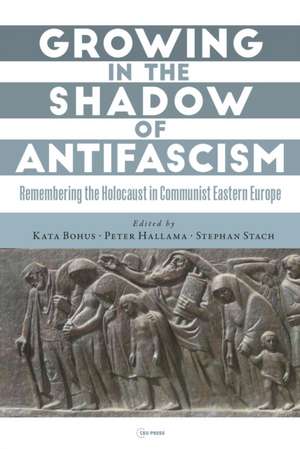Growing in the Shadow of Antifascism
en Hardback – 14 feb 2022
Reined into the service of the Cold War confrontation, antifascist ideology overshadowed the narrative about the Holocaust in the communist states of Eastern Europe. This led to the Western notion that in the Soviet Bloc there was a systematic suppression of the memory of the mass murder of European Jews in the. Going beyond disputing the mistaken opposition between communist falsification of history and the repressed authentic interpretation of the Jewish catastrophe, this work presents and analyzes the ways as the Holocaust was conceptualized in the Soviet-ruled parts of Europe.
The authors provide various interpretations of the relationship between antifascism and Holocaust memory in the communist countries, arguing that the predominance of an antifascist agenda and the acknowledgement of the Jewish catastrophe were far from mutually exclusive. The interactions included acts of negotiation, cross-referencing, and borrowing. Detailed case studies describe how both individuals and institutions were able to use anti-fascism as a framework to test and widen the boundaries for discussion of the Nazi genocide. The studies build on the new historiography of communism, focusing on everyday life and individual agency, revealing the formation of great variety of concrete, local memory practices.
Preț: 461.61 lei
Preț vechi: 569.89 lei
-19% Nou
88.34€ • 95.92$ • 74.21£
Carte disponibilă
Livrare economică 02-16 aprilie
Livrare express 18-22 martie pentru 36.33 lei
Specificații
ISBN-10: 9633864356
Pagini: 300
Dimensiuni: 152 x 229 x 25 mm
Greutate: 0.62 kg
Editura: CEU EDUCATIONAL SERVICE NON-PROFIT LLC
Notă biografică
Dr. Kata Bohus is senior research advisor at the University of Tromsø Dr. Peter Hallama is research fellow at the University of Bern, Switzerland. Stephan Stach is a historian at Leibniz Institute for the History and Culture of Eastern Europe, Leipzig.
